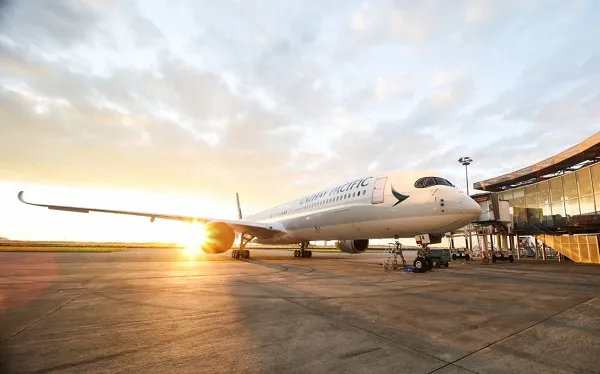
Cathay, Qantas lose codeshare battle
Jul 23, 2019

Cathay Pacific and Qantas faced a setback in their attempt to establish a codeshare partnership, as regulatory authorities denied their proposal. The airlines aimed to collaborate on routes and enhance connectivity, which they argued would benefit passengers through increased travel options and improved services. However, regulators expressed concerns about potential anti-competitive effects and reduced market competition. The decision underscores the challenges airlines face in forming alliances and the scrutiny such arrangements attract from regulatory bodies focused on maintaining a fair marketplace. As a result, both airlines will need to explore alternative strategies to expand their networks independently.
The recent developments in the aviation industry have seen major airlines like Cathay Pacific and Qantas engaged in a fierce competition over codeshare agreements. This battle is not just about expanding networks but also about increasing revenue and customer loyalty. As these airlines navigate through various challenges, it becomes evident that the landscape of codeshare relationships is changing, impacting both the carriers and their passengers.
Understanding Codeshare Agreements
Codeshare agreements allow airlines to sell seats on each other's flights, creating a seamless travel experience for passengers. These partnerships enable airlines to offer more destinations and better connectivity without the need for additional aircraft. However, as Cathay and Qantas have learned, the competition for these agreements can be intense and costly.
The Performance of Cathay Pacific
Cathay Pacific has long enjoyed a robust network in Asia and beyond. However, recent operational challenges, including a drop in passenger numbers due to geopolitical tensions and the lingering effects of the pandemic, have put pressure on the airline. While Cathay has made strides in recovering its service offerings, it now faces stiff competition from other regional carriers vying for the same codeshare opportunities.
Qantas's Strategic Moves
On the other hand, Qantas has been proactive in its approach to expanding codeshare partnerships. With a strong domestic market and a growing international presence, Qantas has focused on aligning itself with strategic partners to enhance its global reach. The airline's recent collaborations have aimed at improving customer experience and optimizing route efficiency, but these moves have also led to intense competition with other airlines, including Cathay.
The Impact of Regulatory Changes
Regulatory changes play a significant role in the codeshare landscape. Governments around the world are increasingly scrutinizing airline partnerships to ensure fair competition and protect consumer interests. As Cathay and Qantas navigate these regulatory frameworks, they must adapt their strategies to comply while still seeking to maximize their market presence.
Challenges Faced by Cathay and Qantas
Both airlines face unique challenges that complicate their quest for codeshare agreements. For Cathay, the ongoing political situation in Hong Kong has affected its operations and reputation. This has made it difficult for the airline to attract new partnerships, as potential codeshare partners may hesitate to associate with a carrier perceived as unstable.
Qantas, while enjoying a strong brand presence, has its own set of challenges. Rising operational costs and environmental concerns have pressured the airline to reassess its business model. Additionally, with competitors also seeking to expand their networks, Qantas must ensure that its codeshare agreements provide significant value to its customers.
Customer Experience and Loyalty
Ultimately, the battle for codeshare agreements comes down to enhancing customer experience. Passengers are increasingly looking for seamless travel options, and successful codeshare partnerships can offer just that. Cathay and Qantas both recognize the importance of customer loyalty and are striving to create compelling offerings through their codeshare arrangements.
| Airline | Current Codeshare Partners | Market Focus | Challenges |
|---|---|---|---|
| Cathay Pacific | American Airlines, British Airways, Finnair | Asia, North America, Europe | Geopolitical tensions, pandemic recovery |
| Qantas | Emirates, American Airlines, Japan Airlines | Australia, Asia, North America | Operational costs, environmental concerns |
The Future of Codeshare Agreements
Looking ahead, the future of codeshare agreements for Cathay and Qantas may hinge on their ability to adapt to the evolving market landscape. With the rise of low-cost carriers and changing consumer preferences, traditional codeshare models may need to be re-evaluated. Both airlines must innovate and find new ways to attract partners that align with their strategic goals.
Conclusion: A Competitive Landscape
The battle between Cathay and Qantas for codeshare agreements illustrates the complexity of the aviation industry. As both airlines strive to enhance their networks and customer offerings, they must remain agile and responsive to market changes. The focus on customer experience will be paramount as they seek to secure their positions in this highly competitive landscape. The outcome of this codeshare battle will not only shape the future of these airlines but also redefine how global travel is experienced by millions of passengers worldwide.
Related Articles

Explore Thailand: The Best Islands to Visit for Paradise, Adventure, and Relaxation

The Ultimate Guide to the Best Islands in Thailand for Your Next Getaway

Do babies need passports? How to get a passport for a newborn

How to get a U.S. passport fast: here’s how to expedite the process

What is Mobile Passport Control: 5 reasons why you should use it

SENTRI vs. Global Entry: A detailed guide

Do you need a passport to go to the Bahamas? Let’s find out

Do you need a passport to go to Mexico? A detailed guide

Do you need a passport to go to Canada? We got the answer

Do You Need a Passport for a Cruise: An Essential Travel Guide

Booster Seat Requirements: All the Rules to Follow in Your Rental Car

What Are the World’s Most Powerful Passports, and How Does Yours Rank?

How to Take a Passport Photo at Home: A Helpful Guide

You've got to have heart! Southwest's new livery

Your opinion: Should water be free on low cost carriers?

Young women bolder than guys as solo travellers
